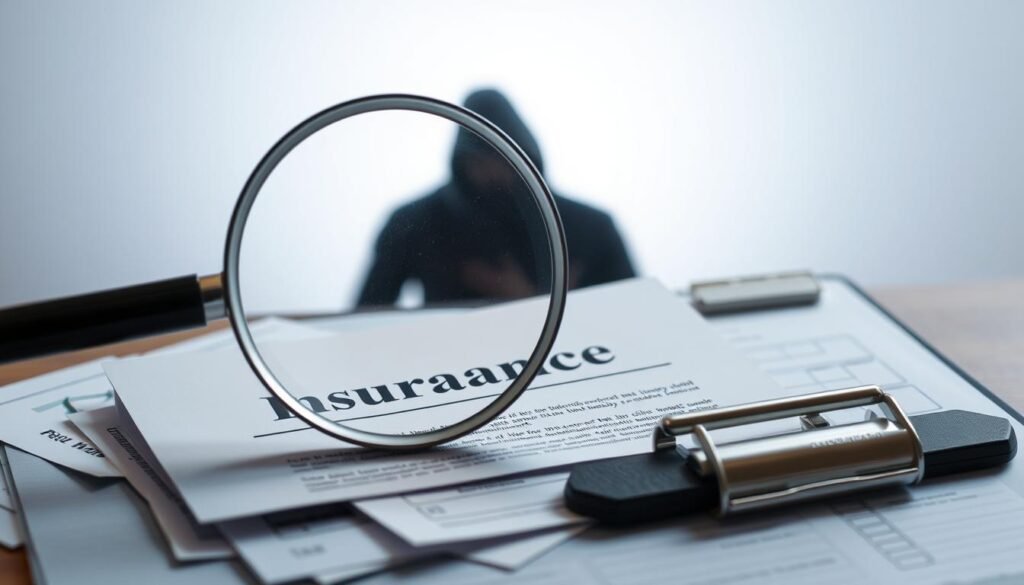Insurance fraud is a big problem that can hurt many people. By learning how to spot fraud, you can keep your money safe. Knowing how scammers work is key to stopping them. Being alert and informed is your strongest defense against fraud.
In this article, we’ll share tips and warning signs to help you avoid fraud. This way, you can make sure your insurance works for you, not against you.
Key Takeaways
- Recognize the importance of being vigilant against insurance fraud.
- Understand common fraud tactics to become a more informed policyholder.
- Implement prevention strategies to protect your financial assets.
- Familiarize yourself with the signs indicating potential fraud.
- Stay informed about your rights as a policyholder.
Understanding Insurance Fraud
Insurance fraud is when people use lies to get benefits they shouldn’t have. It’s about dishonest acts to get ahead in the insurance world. Many people might unknowingly fall into or commit fraud. It’s key to understand this to stop fraud.
Definition and Types of Insurance Fraud
Insurance fraud means lying to get benefits you shouldn’t get. There are many types, including:
- Health care fraud: This is when someone lies to get healthcare benefits they don’t deserve.
- Automobile fraud: People might fake accidents or overcharge for repairs to get more money.
- Property fraud: Damaging property or lying about damage to get more money is fraud.
- Life insurance fraud: This includes lying about how someone died or if they even existed.
The Impact of Insurance Fraud on Policyholders
Insurance fraud hurts more than just the cheaters. It affects everyone who pays for insurance. When fraud happens, companies raise prices to cover their losses. This means honest people pay more for the same coverage.
It also wastes resources in the insurance world. This can lead to fewer services for everyone. Knowing how fraud affects us shows why honesty is so important in insurance.
Identifying Insurance Fraud: Tips for Prevention
Being vigilant is key in fighting insurance fraud. You can use tips for identifying insurance fraud to spot suspicious activities. Keep an eye on your claims history for any oddities. Look out for unexpected charges or claims that don’t match your coverage.
Be on the lookout for unusual billing or documentation patterns. Inflated claims or details that don’t add up can be a sign of fraud. It’s also important to stay in touch with your insurance provider. They can help spot red flags and clear up any policy confusion.
Knowing your rights as a policyholder helps you report concerns quickly. Get to know your insurance policy well. Stay alert to any changes or oddities in your policy details.
- Regularly review your policy and any changes made.
- Keep detailed records of talks with your insurer.
- Stay updated on common fraud schemes that affect your coverage.
By watching for suspicious activities, you can protect yourself and your money. Use these tips to build your knowledge and stay ahead of insurance fraud.
Common Red Flags of Insurance Fraud
It’s important for both policyholders and insurers to know about insurance fraud red flags. There are many signs that can point to fraud. Knowing these signs helps you spot suspicious behavior and act quickly.
Unusual Claim Patterns
Unusual claim patterns are a big warning sign. Be careful if claims happen right after you get a policy. Or if you have many claims in a short time. These patterns are often seen as red flags and need more checking before settling.
Inconsistencies in Documentation
Inconsistencies in documents often mean fraud. Watch for different stories in claims, odd medical records, or strange report formats. These differences are key in figuring out if a claim is real.
History of Previous Claims
Having many claims can also be a red flag. If someone has lots of claims that might be fake, it’s a sign of trouble. Insurers look closely at people with many claims, thinking they might be dishonest.
| Red Flag Type | Description |
|---|---|
| Unusual Claim Patterns | Claims made soon after policy inception or multiple claims in quick succession. |
| Inconsistencies in Documentation | Conflicting statements, discrepancies in medical records, or odd documentation. |
| History of Previous Claims | Frequent claims with potential links to fraudulent activities. |
Insurance Fraud Prevention Strategies
Stay ahead of insurance fraud by being proactive. Understanding and acting on fraud prevention strategies is key. Focus on education and policy reviews to build a strong defense.
Educating Yourself and Your Family
Learning about fraud is a powerful way to fight it. Teach your family about scams and exaggerated claims. Talking about these topics can make you all more aware and safer.
Regularly Reviewing Your Insurance Policies
Reviewing your insurance policies regularly is crucial. It keeps you informed and helps spot fraud. Make sure your policy fits your current needs. If you see anything odd, like sudden price hikes or strange claims, act fast. This careful approach helps protect your money.

How to Detect Insurance Fraud
Detecting insurance fraud needs advanced techniques and teamwork. The right technology boosts your ability to spot suspicious activities. Combining tech and industry know-how protects your interests well.
Utilizing Technology in Fraud Detection
Today’s tech has changed how we find insurance fraud. You have software and databases to check claim trends. These tools spot odd claims that might be fake. Key tech includes:
- Data analytics software: Looks at big data for unusual claim patterns.
- Machine learning algorithms: Gets better at spotting fraud over time.
- AI-powered systems: Finds high-risk claims with predictive models.
Working with Professionals
Getting help from fraud experts is crucial. Fraud investigators and forensic accountants offer insights tech can’t. They do deep audits and spot fraud signs. Working with them means you get:
- Expert analysis: A better understanding of suspicious claims.
- Practical experience: Knowledge from dealing with tough fraud cases.
- Increased accuracy: Better at telling real claims from fake ones.
Using tech and professional help makes your fraud detection stronger. This combo helps you act fast and keep your insurance safe.
| Technology Tools | Functionality | Benefits |
|---|---|---|
| Data Analytics Software | Analyzes claim trends | Identifies irregular patterns |
| Machine Learning Algorithms | Improves detection accuracy | Reduces false positives |
| AI-powered Systems | Predictive modeling for risk | Enhances fraud detection capability |
| Fraud Investigators | Conduct thorough audits | Expert insights on suspicious claims |
| Forensic Accountants | Assess financial records | Identify fraud indicators |
Insurance Fraud Prevention Measures
It’s vital to protect your assets and trust in insurance by preventing fraud. Start by setting up strong internal controls and checking claims data carefully. Use data analytics to spot fraud patterns. Also, talk often with your insurance agents to stay alert and get help when needed.
Keeping your personal info safe is key. Use strong passwords, encrypt your messages, and store documents securely. Be careful of unsolicited insurance offers, as they might be scams trying to trick you.
Here are some tips to help you fight fraud:
- Check your insurance policies often to make sure they still fit your life and needs.
- Think twice before sharing personal details online or in public.
- Tell your insurance company right away if you notice anything odd.
- Join workshops or seminars to learn more about insurance fraud.

By following these steps and tips, you can protect yourself from fraud. Stay alert and proactive to keep your finances and personal info safe.
| Fraud Prevention Measure | Description | Benefits |
|---|---|---|
| Internal Controls | Set up strict rules for checking claims data. | Less chance of fake claims getting approved. |
| Data Analytics | Use tech to find and stop fraud patterns. | Better at catching fraud and acting fast. |
| Secure Personal Data | Keep your personal info safe with strong security. | Protects against identity theft and fraud. |
| Communication with Agents | Keep in touch with your insurance agents. | Guarantees quick action on suspicious claims. |
Practical Tips for Preventing Insurance Fraud
It’s crucial to know how to avoid insurance fraud today. By using practical tips, you can manage risks better. Knowing your policyholder rights helps you talk to your insurance company with confidence.
Know Your Rights as a Policyholder
Your rights as a policyholder are key to a good insurance experience. Knowing these rights lets you question claims that don’t seem right. Here are some important rights to remember:
- You have the right to clear and honest policy explanations.
- You can ask for detailed info on any claim you make.
- It’s your right to report any suspicious activity to keep insurance honest.
On Alert: Stay Compliant and Informed
Knowing about fraud helps you spot scams and warning signs. Here are some tips:
- Check your policy documents often to know what’s covered.
- Go to workshops or sessions your insurer offers on fraud.
- Follow trusted sources or forums on preventing insurance fraud.
By focusing on knowledge and following rules, you lower your risk of fraud. Knowing your rights and taking action makes your insurance safer.
| Policyholder Rights | Actions You Can Take |
|---|---|
| Right to Understand Policy Terms | Ask for clarification on terms you don’t understand. |
| Right to Challenge Unclear Claims | Document your claims and ask for explanations. |
| Right to Report Fraud | Contact authorities if you suspect fraudulent activity. |
Reporting Suspicious Activity
Insurance fraud needs quick action and understanding. Knowing when to report fraud is key. Quick and accurate reports help insurance companies fight fraud, protecting real policyholders.
When and How to Report Fraud
If you think someone is cheating on their insurance, act fast. Look out for odd claims or strange behavior. You can call your insurance company or use a fraud hotline. Make sure to give all the details, like:
- Claim number and policy details
- Specifics of the fraudulent activity observed
- Date and time of the incident
- Any supporting documentation or evidence
The Role of Insurance Companies in Fraud Prevention
Insurance companies are key in stopping fraud. They use special tools and methods to find and stop fake claims. They also work with police to fight fraud better. This teamwork helps keep real policyholders safe.

| Fraud Reporting Steps | Information Needed |
|---|---|
| 1. Identify suspicious activity | Details of the claim and inconsistencies |
| 2. Contact your insurance provider | Claim number and policy information |
| 3. Provide detailed information | Evidence and documentation of the fraud |
| 4. Follow up | Maintain communication for progress updates |
Legal Implications of Insurance Fraud
It’s important to know the legal effects of insurance fraud. This is true for both those who have insurance and those who might cheat the system. Laws in the U.S. are tough to stop fraud and keep insurance fair. Learning about these laws can help keep you safe and support a fair insurance market.
Punishments for Committing Insurance Fraud
The penalties for insurance fraud depend on the type and how big it is. Here are some common punishments:
- Fines: People caught can face big money penalties, from thousands to millions.
- Restitution: They might have to pay back money they shouldn’t have gotten.
- Imprisonment: In serious cases, they could go to jail for a long time.
- Probation: They might have to follow rules and be watched closely.
- Loss of License: If they’re professionals, they could lose their right to work.
These punishments are meant to scare people away from fraud. Below is a table showing different fraud types and their possible legal outcomes.
| Type of Fraud | Possible Fines | Probable Imprisonment |
|---|---|---|
| Minor Fraud | $1,000 – $10,000 | Less than 1 year |
| Moderate Fraud | $10,000 – $100,000 | 1 – 5 years |
| Severe Fraud | $100,000+ | 5 – 20 years |
Conclusion
Understanding insurance fraud is key to protecting your money and keeping the insurance system honest. We’ve looked at different types of fraud, how to spot them, and how to prevent them. This summary shows why it’s important to stay informed and watch out for scams that could harm your policy and finances.
Insurance fraud affects not just you but the whole insurance industry. By using the tips we’ve shared, you can spot and stop suspicious actions early. Also, reporting fraud is crucial. Your actions can help stop scams and make the insurance system better for everyone.
Being careful, teaching your family, and knowing fraud signs are essential. These steps help protect your money and the insurance system’s trustworthiness. By doing this, you help keep insurance a reliable safety net for all.
FAQ
What are the most common types of insurance fraud?
Insurance fraud comes in many forms. This includes health care, auto, property, and life insurance scams. Each scam aims to cheat the system, causing financial harm to both insurers and policyholders.
How can I identify potential insurance fraud?
Watch for signs of fraud by checking your claims history. Look for odd billing patterns and any document discrepancies. Be cautious of too many claims in a short time or claims right after getting a policy.
What are some effective strategies for preventing insurance fraud?
To avoid fraud, learn about common scams and stay informed. Review your policies often for any odd claims. Also, keep in touch with your insurance company to stay updated.
What are some red flags that may indicate insurance fraud?
Look out for unusual claim patterns and document inconsistencies. Also, be wary of a history of suspicious claims. Spotting these signs early can help prevent fraud.
How can technology assist in detecting insurance fraud?
Technology helps detect fraud through special software and databases. These tools analyze claims and spot patterns. They make it easier to catch suspicious activities.
When should I report suspected insurance fraud?
Report fraud as soon as you see something odd. Know how to report it to your insurance company. Give them all the details you can.
What legal consequences can occur from committing insurance fraud?
Insurance fraud can lead to fines and jail time. It’s serious and harms the insurance industry. Knowing the risks helps keep the system honest.
How can I secure my personal information to prevent insurance fraud?
Protect your info with strong passwords and updates. Don’t share personal details without a good reason. Be careful with online offers and keep your data safe with your insurance company.
What role do insurance companies play in preventing fraud?
Insurance companies fight fraud by investigating and using detection tools. They work with law enforcement to stop scams. Their efforts protect policyholders and keep the industry fair.




